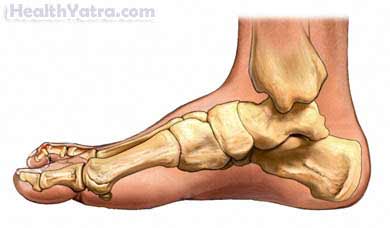Definition
A hammer toe is a toe that tends to remain bent at the middle joint in a claw-like position. There are two types of hammer toe:
- Flexible hammer toe—can be straightened by hand
- Rigid hammer toe—cannot be pulled straight and can be extremely painful. The position of the toe can also lead to corns or calluses . These may also be painful.
The sooner a hammer toe is treated, the better the outcome. If you suspect you have this condition, contact your doctor.

Causes
Hammer toe may be present at birth or develop later in life due to:
- Tendons that have tightened, causing the toe’s joints to curl downward
- Wearing inappropriate footwear:
- Shoes that don’t fit properly, for either an adult or child
- High heels
- Narrow-toed shoes
- Arthritis
- The foot having a high arch
- Injury to a toe
Occasionally, all toes may be bent. This may be due to problems with the peripheral nerves or the spinal cord.
Risk Factors
Factors that increase your chance of getting hammer toe include:
- Family history of hammer toe
- Arthritis
- Foot and ankle abnormalities
- Frequent use of the inappropriate footwear
Symptoms
If you have any of these symptoms, do not assume it is due to hammer toe. Talk to your doctor about symptoms such as:
- A toe that curls down
- Corns on the top of a toe
- Calluses on the sole of the foot or bottom of the toe
- Pain in the middle joint of a toe
- Discomfort on the top of a toe
- Difficulty finding any shoes that fit comfortably
- Cramping in a toe, and sometimes also the foot and leg
- Difficult or painful motion of a toe joint
- Pain in the ball of the foot or at the base of a toe
Diagnosis
Your doctor will ask about your symptoms and medical history. A physical exam of the toe will be done. Your doctor can diagnose hammer toe by its appearance.
Treatment
Talk with your doctor about the best treatment plan for you. Treatment options include the following:
Conservative Treatments
- Splinting the affected toe
- Switching to properly sized footwear with roomy toe boxes
- Splints, straps, cushions, or corn pads to relieve symptoms
Corrective Surgery
Severe cases require an operation to straighten the joint.
- Tendons may be cut or transferred.
- The middle joint of the toe may be fused together.
If you are diagnosed with hammer toe, follow your doctor’s instructions .
Prevention
To help reduce your chances of getting hammer toe, take the following steps:
- Avoid wearing poorly fitting or narrow-toed shoes.
- Avoid heels higher than two inches.
- Check your child’s shoe size often.
